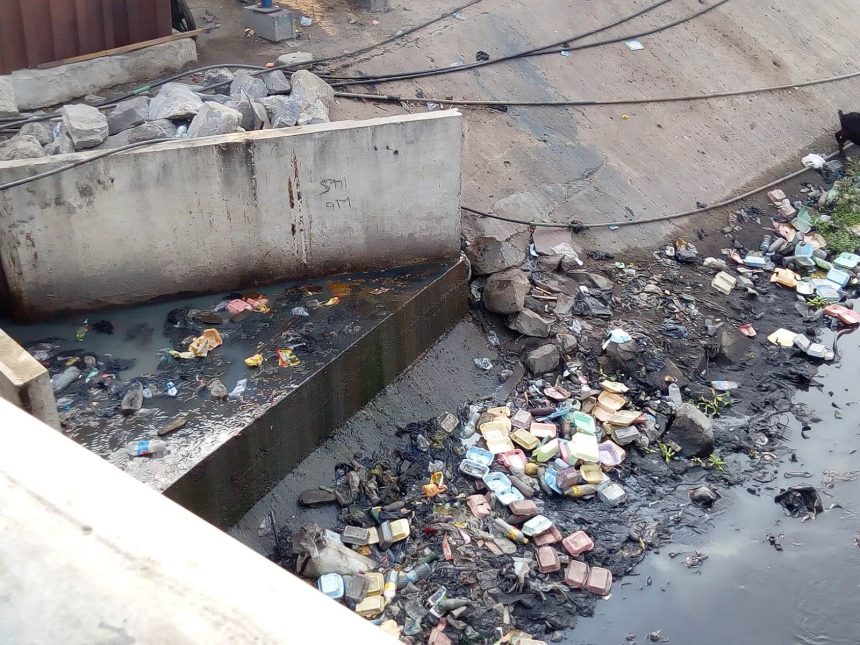Obanliku is a local government area (LGA) in Cross River State. In December 2016, representatives from the federal ministry of health and water resources, the Cross River State government, and development partners gathered in Calabar, the state capital, to officially declare Obanliku open defecation free (ODF).
It was not only a happy time for the state but the entire country because the declaration meant Obanliku was the first-ever ODF LGA in Nigeria.
Nigeria, Africa’s biggest economy with 774 LGAs, had lagged in the global struggle to end open defecation (OD), which is associated with disease outbreaks like cholera, diarrhoea, and typhoid.
At the time, 47 million Nigerians, over a quarter of the population, practised OD, data from Water Aid shows. And just a little above half of all households owned toilets.
According to UNICEF, besides OD-associated social stigma, Nigeria loses 1.3% of its GDP or NGN 455 billion (US$ 3 billion) annually due to poor sanitation, including spending to treat OD-linked diseases and incidents like snake bites.
Today is World Toilet Day 2021, and a fact-check report by Africa Check shows that 38.4 million citizens still defecate in the open. On the surface, the difference between 47 million in 2016 and 38.4 million in 2021 does not suggest much improvement considering the five-year gap. But a closer look suggests some good progress.
To appreciate the improvement, consider that when 47 million practised OD, Nigeria’s population was 185.9 million, meaning 25.2% of the population practised it.
But Nigeria’s population is now estimated to be 213.1 million, a 12.8% uptick. Yet, the number of people practising OD has not swelled with the population growth. Instead, it has dropped by 19.3% per the difference between 47 and 38.4 million, meaning only 18% of the population now practice OD.
The progress happened because there were efforts – enough to have powered 60 more LGAs to ODF status after Obanliku.
The efforts
In 2012, the federal government and a United Nations body, the Water Supply and Sanitation Collaborative Council (WSSCC), partnered and launched the Rural Sanitation and Hygiene Promotion in Nigeria (RUSHPIN).
With funding from WSSCC’s Global Sanitation Fund, RUSHPIN aimed to transform the health conditions of 1.2 million poor people in six select LGAs in Benue and Cross River states between 2012 and 2020, using the community-led total sanitation (CLTS) approach to mobilize communities to own efforts towards ending OD.
“We engaged community leaders [and] got them to realize the need for a collective action plan toward good health and well-being, and the need to end open defecation,” Thomas De Douhet, the Nigeria country director of United Purpose, an international charity that implemented RUSHPIN, told PRIME PROGRESS via an email response.
“We then got the leaders to mobilize their respective communities for community meetings. A team of facilitators – (from the) LGAs, CSOs (civil society organisations) and United Purpose facilitated sessions of CLTS. Community members were brought face to face with the reality of the practice of open defecation and what it could lead to. At the end of each community meeting, the respective communities agreed on a plan to end this practice, and United Purpose and its partners then made periodic visits to the communities to ensure that the agreed actions were being carried out.”
By 2015, RUSHPIN had helped hundreds of communities in the two states gain the ODF status. However, it took a little over four years from inception to get all communities in a single LGA certified ODF for LGA-wide success. The delay was partly due to poor commitment from the state and local governments concerned.
But, thankfully, months after the administration of current Governor Ben Ayade of Cross River was sworn in in May 2015, it renewed commitments to cut down the state’s incidences of cholera and diarrhoea by addressing open defecation more seriously. The state had been among 12 states with the highest cholera and diarrhoea burden in Nigeria.
With RUSHPIN already in place, “[We] set to work by mapping out a strategic plan [and] working with partners like UNICEF and United Purpose, with direction from the federal government,” Betta Edu, the state commissioner for health, told PRIME PROGRESS.
Through its Rural Water Supply and Sanitation Agency (RUWATSSA), the government worked with partners to set up local water, sanitation and hygiene committees (WASHComs) in LGAs and communities. The state government also worked with LGAs to make local laws prohibiting OD, especially in targeted LGAs like Obanliku, Bekwara and Boki.
“The Cross River State government made special efforts in their support and collaboration in the RUSHPIN Programme by releasing staff, allowing United Purpose to operate freely in the LGAs it was funding,” said Douhet. “Their staff and personnel were at hand to support and guide any of the initiatives we approached them with.”
Approaches for triggering communities to change behaviour in Cross River varied from LGA to LGA/community to community. One method was to use leaders of LGAs and communities that have been certified ODF to challenge those of LGAs/communities where OD was still prevalent.
For example, the paramount ruler of Boki LGA, Otu Fredaline Akandu, was invited to the event where Obanliku was declared ODF. He left the event a changed man.
“I witnessed the occasion, and I said, ‘Obanliku, a small local government created just a few years back, they won? Why? Is it because they are educated, or they are rich? No, it was understanding,’” Akandu explained to PRIME PROGRESS.
“[When] I came back, I organized a meeting of all the whole clan and village heads of Boki in my palace. I told them what I saw in Obanliku, that we should copy what Obanliko had done. I was moving from one village to another as a town crier, telling the people the need for us to have toilets. I put my voice on the radio, announcing to all the communities.”
He also appealed to financially capable individuals and families to support less capable ones to build and own toilets. He took the lead by being the first to donate.
Through these collective efforts, one by one, six LGAs in Cross River became ODF and Boki was the sixth in 2019. Others were Obanliku (first), Bekwara, Yakurr, Ikom, and Yala – though the last three were supported with funding from UK Aid under a separate United Purpose-implemented project called Community-led Health Improvement Through Sanitation and Hygiene Promotion in Nigeria (CHISHPIN).
In Benue, the three targeted LGAs also achieved ODF. But the success in Cross River made Cross River the state with the highest number of ODF LGAs in Nigeria.
However, since 2019, the campaign has not expanded to LGAs where OD is still being practised majorly because the state government allegedly did not release its 25% counterpart funds.
(Cross River) “did not release funding to allow us to expand the initiative to three of the proposed LGAs – Ogoja, Obudu and Akampa,” Douhet complained. His claim agrees with a 2019 published communique in which UNICEF, United Purpose and other partners appealed to the state to release funds.
But Edu, Cross River’s health commissioner, denied the claims. She told PRIME PROGRESS that the failure to expand should be blamed on the COVID-19 pandemic.
“We released counterpart funding in 2019 and 2020 (to the Global Sanitation Fund). Unfortunately, COVID would not allow anybody to do anything last year,” she said.
Katsina takes top spot
While Cross River struggles to expand, Katsina State has taken the top seat, with its 10 LGAs recently certified ODF. SHAWN (Sanitation, Hygiene Water Supply in Nigeria), another project, pushed Katsina to success.
With funding from the UK’s Department for International Development, UNICEF and the Nigerian government launched SHAWN in 2016 in 12 LGAs in Bauchi, Jigawa, Benue, Katsina, Kaduna, and Zamfara states to improve access to toilets by connecting toilet entrepreneurs to rural communities and households.
SHAWN allows toilet business owners to construct improved latrines for households at affordable prices using hundreds of trained masons.
It also covered several funding options: including creating savings and credit groups that allow households to contribute money and give to members as loans for toilet construction, working with microfinance banks to let households borrow money, funds injection from state governments, and a barter system that allows families to give their properties to toilet business owners in exchange for toilet construction.
The Katsina State government supports households to use the various options, hence the success. Across the states where SHAWN is present, the project has scaled to 60 LGAs with 12,423 improved toilets constructed.
RUSHPIN, CHISHPIN, and SHAWN have been the biggest drivers of ODF success in Nigeria. Each programme relied on proof that close to 100% of a community/LGA’s population no longer defecates in the open but uses toilets before certification is given. The proof is obtained via layers of verification involving development partners and local, state and federal WASH departments, said Florence Oluohu, coordinator of WASH Media Network, a body of independent journalists telling WASH-related stories in Cross River.
Any lessons?
State’s eyeing to succeed like Cross River and Katsina should adopt all the effective approaches the two states used. But more importantly, they should work with local community leaders and release funds in time.
“This is one of the biggest factors,” Douhet said. “The leadership of the local communities were our biggest champions. They embraced the struggle for the well-being of their people, encouraged every community meeting and allowed their volunteers.’
Meanwhile, the Nigerian government, in 2015, developed a roadmap to end OD by 2025. But with the slow pace of progress, it is unclear if it would meet the target.
For now, people in ODF-certified areas say they now love their clean environment with its new smell of good health. “I have forgotten when last we had several cases of diarrhoea among children or adults,” said Harrison Odudu, a former councillor of Buentsebe ward in Boki.





